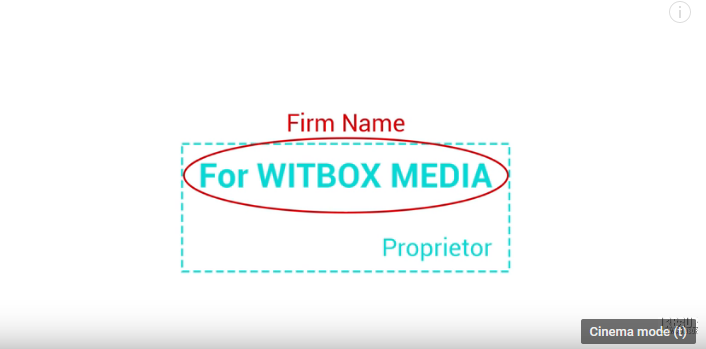Proprietorship business is an unincorporated business where there is only one business owner. The owner pays taxes on behalf of the business as part of his personal income tax. This is also referred to as sole proprietorship or sole trader. Proprietorship business is one of the easiest to set up since there is no government regulation involvement. This article details the different facets involved with setting up a proprietorship business.
Table of Contents
How to open bank account for proprietorship?
Since there is no separate registration formality required for starting a proprietorship business, as long as one has a PAN card, one can open a bank account on their name to begin transactions for the business. It is however suggested to make business transactions from a current account rather than a savings account. This is because the government and income tax department keep a track of large transactions happening on savings accounts. Although one can make few transactions for the business from their savings account, the majority transactions must be held from the current account.
Documents for opening bank account
To open a bank account for proprietorship business, one needs the following:
- PAN card – This will be same for both owner and business. Proprietorship business does not require a separate PAN.
- Any one business certificate – This can be Shop & Establishment, MSME or GST certificate.
- Address proof – A rented office on owner’s name works for this. If one does not have this then other option will be to make a rent agreement for one room of their house from the owners of the house, which would be the parents in most cases. If even this is not possible then as a last resort one can get a postpaid internet connection to their home and use that bill as address proof.
Additionally, if the proprietorship business has a separate name than it is advisable to make a seal for it in the below format.

Proprietorship name registration
While one may begin the business under their own name, once it starts to take off and grow it is advisable to have a separate name for the business. This separate name must be used for all business transactions. To register the name of the business, one needs a certificate with the proprietorship business’ name. The easiest certificate to obtain would be a Shop & Establishment Act certificate. This has minimum compliances and fees too.
One can obtain this from either online or through their local dealer. Almost all private banks in the country accept the Shop & Establishment Act certificate along with a PAN card to register a proprietorship bank account. Meanwhile, public banks may only ask for a Udyog Aadhaar certificate for MSME. This can be obtained within a few days by applying online.
If neither of these two are sufficient then one can opt for a GST certificate. This is important if one needs to sign a contract, start an ecommerce or do B2B business.
When is GST certificate important?
Apart from the reasons given above, a GST certificate for the business is mandatory when one’s business crosses a turnover threshold. This certain turnover threshold depend on the nature of the business. If one is into sale of goods or physical products, then an annual turnover of above Rs 40 lakh needs a GST. On the other hand, if the business provides services then an annual turnover of over Rs 20 lakh requires a GST.
Types of GST registration
Apart from the mandatory reasons for GST requirement, one also has to note the types of GST certificate available.
Composite GST – The GST rate is lower and compliances to follow are fewer. But owner cannot collect taxes from their customers and has to pay overall GST for the business. They cannot make interstate sales. The sales are restricted to intrastate (within a registered state) only. One must only opt for this option when record keeping is difficult for them.
Regular GST – Regular GST incurs payment of taxes at the prescribed rate on the turnover with the adjustment of input tax credit. They can make interstate sales as well as local sales. But a higher rate of tax is applicable (like 0%, 5%, 12%, 18% and 28%).
What is GST input credit
To understand the concept of GST input credit we take the following example. Suppose business A buys goods worth Rs 1 lakh. This has GST of 5%. Thus, total value of goods bought will be Rs 1,05,000. Now, A sells the goods to B for Rs 1.2lakh with GST of 5%. Thus, total sales value becomes Rs 1,26,000.
Therefore, input GST is Rs 5000 and output GST is Rs 6000, which business A has to pay to the government. But in reality, the input GST is adjusted against the output GST. Hence, the actual GST amount to be paid to the government will be Rs 1000. The actual GST payment is done by the person finally buying the goods.
The issue lies when business work on credit for buying goods but have to sell the good with pakka bill. Hence, they have to pay the ultimate GST amount on their behalf, while the payment from upper level is yet to come.
Is balance sheet mandatory?
If the volume of business sales runs in lakhs then it is a good practice to maintain a balance sheet. This also helps in learning the profit and loss earned by the business as well as the income tax liability for it. Balance sheet is mandatory once the business crosses a threshold of Rs 2 crore worth of turnover.
But just for record-keeping purposes it is suggested to keep a track of all the business’s incomes and expenses. This can be handed to the accountant to calculate the profit or loss of the business and the tax to be paid.
Secondly, since one owner can have multiple proprietorship businesses under their name and the same PAN card, it is a good practice to keep records for all individually. Ultimately, the tax will be filed under one name, hence this eases the calculation for all business taxes.
Thirdly, all expenses for the business such as travel, food, etc. can be deducted under business expense if proper records are kept for it.

Proprietorship business complainces
Labour law compliances
As a business, the following labour law compliances need to be maintained.
- All businesses in India fall either under Factories Act or Shop and Establishment Act. All manufacturing business fall under factories while all other services fall under shop and establishment. Hence, this certificate is needed as soon as one starts a business.
- Once employees start being hired for the business, then Professional Tax and Labour Welfare Fund registrations are needed. The number of employees threshold depends on the state. Some require it for the first employee itself while some need 5-10 employees. Professional tax is however needed even if it is just the owner running the business service, such as a freelancer or a CA.
- After 10 employees are hired, ESI registration becomes compulsory.
- After 20 employees are hired, PF registration becomes compulsory.
- Bonus, gratuity and other compliances are also needed after hiring 20 employees.
It is recommended that once 10 or more employees are hired and the business has grown, to change it from proprietorship to partnership firm. A family member can be registered as the partner if one does not have an actual business partner. Partnership firm will have a separate PAN card which will be helpful in maintaining separate records for individual business compliances, instead of having everything registered under one’s personal PAN. Even for closure of a proprietorship firm it is difficult to produce documents since one’s individual PAN cannot be closed. Hence, partnership firms are easier to close too by surrendering all compliance registration numbers.
Tax compliances
- All proprietorship firms are considered as one for an individual owner. Everything can be run under the same PAN. All income from individual business will be calculated under income from business for the owner. He will be liable to pay the tax as required per the tax slab rate for this.
- The government however does provide the benefit of presumptive tax to small business owners. Under presumptive tax, one needs to pay tax on certain percentage of the business income considering it as profit. The government will accept this, no questions asked, without any audit. So long as the numbers are correct on the owner’s part. The ITR filing for it should be correct.
This is applicable for businesses with a turnover of less than Rs 2 crore. Under Section 44AD of the Income Tax Act, they need to file ITR 4 and account for 8% profit of business.
Meanwhile, for professionals, presumptive tax is filed under section 44ADA of the income tax ac. They is applicable if professionals have turnover of less than Rs 50 lakh. They need to file 50% of profit as presumptive tax under ITR 4.
- If turnover is less than Rs 2 crore and presumptive tax is being paid, then no accounts keeping or audit is required. But above that, one needs to hire a CA for proper auditing of accounts. If the net tax liability is more than Rs 10,000, then one needs to pay advance tax four times annually. Additionally, the ITR filing last date falls on 31st July annually for non-audited and 30th September for audited proprietorship firms.
GST compliances
There are four quarterly GST returns along with an annual GST return to be paid. Additionally, GST liability has to be paid every month. These are as follows:
- GSTR-1 (monthly)
- GSTR-1 (quarterly)
- GSTR-3B (assessee type-I)
- a GSTR-3B (assessee type-II)
- GSTR-3B
- a GSTR-3B (assessee type-I)
- GSTR-3B (assessee type-II)
- GSTR-4 (annually)
- CMP-08
- ITC-04
- GSTR-5
- GSTR-5A
- GSTR-6
- GSTR-7
- GSTR-8
- GSTR-9
- GSTR-9A
- GSTR-9C
TDS compliances
If the employees hired have earnings which fall under taxable limit then their tax has to be deducted by owner and paid to government. Likewise if payment of over Rs 30,000 is being paid to a professional then tax has to be deducted from it. Even rent of a factory or office to to have TDS deduction.
Small business with less than Rs 1 crore turnover do not have mandatory TDS compliance. For over Rs 1 crore, TAN number and TDS deduction is mandatory.
Cash payments
The government allows cash payments for up to Rs 10,000. Over than cash transactions cannot be complained under business deduction. This is only not applicable for businesses paying presumptive tax.
Depreciation
All resources and assets used for business purposes are qualified under depreciation for a businessman. But depreciation is not allowed under section 44AD of presumptive tax.
Can salaried employees start proprietorship business?
For salaried employees in the private sector, there is no prohibition under income tax act to have a proprietorship business on the side. It is important to keep accounting for both salary and business separate though. But for government employees it is morally and legally wrong to run a proprietorship business on the side. Although they are often seen to run such businesses under the name of another family member in India.
Important suggestions to note
- Don’t wait till the end of the financial year to make your balance sheet. Rather keep track of income and expense on a monthly basis. Monitor it regularly and start your tax planning early.
- Always maintain records for all business transactions. This helps in correct tax payment.
- Maintain proper employee records for attendance, PF payment, ESI payment, salary slips, increments, etc. This helps to keep track of employee count and mandatory compliances.
- To big business wherein one needs to take loans from banks, it is better to not run them under proprietorship. If there is any default on loans, then banks can sell one’s properties to make payment for it.
Disadvantages of proprietorship firm
- Difficult to get loans or monetary funding for it.
- There is not much scope to scale the business.
- It is difficult to convert proprietorship firm to OPC or other business model.
- Overall business protection and continuity is difficult too.
Watch all details below.
Read more, Sole Proprietorship vs LLP vs Private Ltd. | Business Basics.
Join the LLA telegram group for frequent updates and documents.
Download the telegram group and search ‘Labour Law Advisor’ or follow the link – t.me/JoinLLA
It’s FREE!



